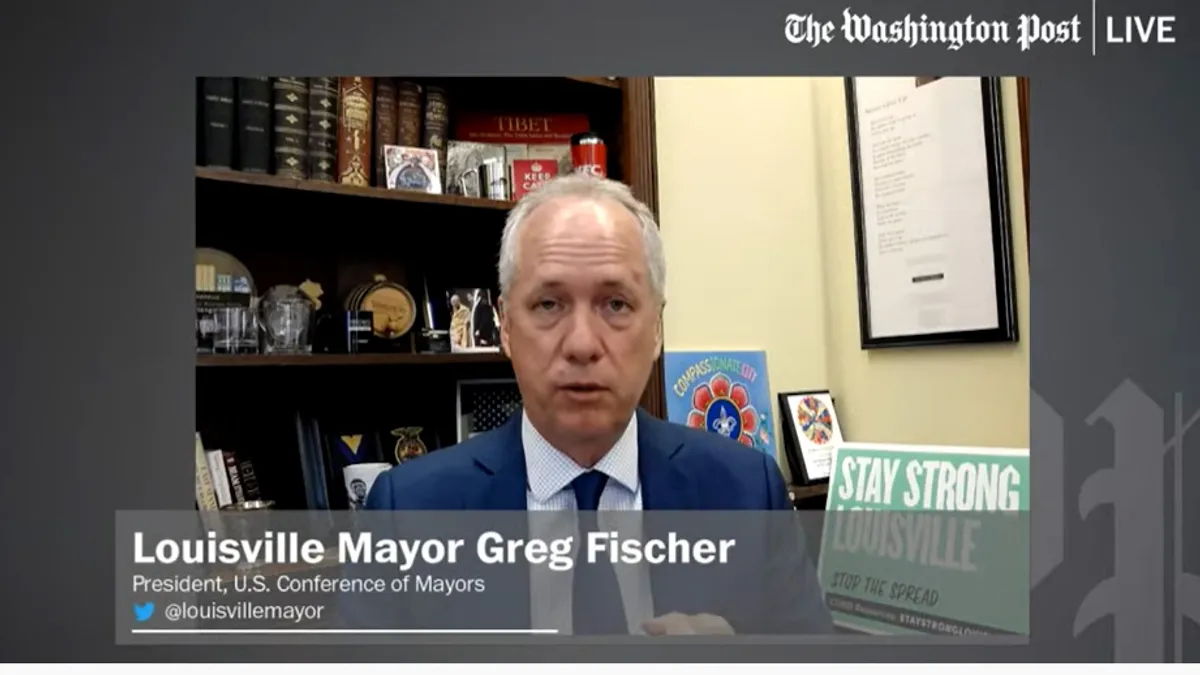Dive Brief:
- Louisville, KY, Mayor and U.S. Conference of Mayors President Greg Fischer said Wednesday the United States must "redefine what infrastructure is" to remain competitive with the rest of the world and reboot its economy.
- Fischer, an enthusiastic backer of President Biden's American Jobs Plan, said during the virtual event hosted by The Washington Post that investing in areas like broadband internet, electric vehicles (EVs) and public health in addition to traditional infrastructure like roads, bridges and airports will create jobs and prepare the country for innovations over the next five decades.
- While there are questions about how the Biden administration and Congress intend to pay for the $2 trillion package, Fischer said the time for political "squabbling" has long passed, and elected officials should focus on taking bold action.
Dive Insight:
Biden’s American Jobs Plan pledges investment across a broad swath of infrastructure in part to reverse what the American Society of Civil Engineers (ASCE) recently said is a $2.6 trillion infrastructure funding gap. That underinvestment resulted in ASCE assigning the country’s infrastructure a 'C-' grade. Such investments have retained broad support across the political spectrum — despite the lack of progress in recent years.
Fischer cited polling from progressive group Data for Progress, which showed 73% of respondents favor the American Rescue Plan, compared with 21% that oppose the effort. Separate polling from Ipsos, however, showed respondents more evenly divided on the plan as a whole but in favor of investment in certain areas. Regardless, Fischer said it shows Americans are saying they want politicians to "come to the adult table and solve some problems."
Biden’s plan has received criticism from some experts who say it invests too little in traditional infrastructure like roads, bridges, ports and airports and instead invests in other areas like broadband and elderly care. But Fischer said looking to the future and investing in areas like broadband internet and the electric grid are necessary to help harness the jobs of the future.
"When you think about infrastructure in 50-year-old terms, you're going to lose the battle of today, much less the battle for tomorrow," he said.
One initiative Fischer highlighted is the move to electrify transportation. The American Jobs Plan would invest in that heavily to have 500,000 EV chargers publicly available by 2030, in addition to electrifying transit and federal vehicles. He also said the move to electrify transportation is an "unstoppable" trend that will create jobs and help reduce emissions, and that the government must lead on the issue.
"We don't want to prepare when it’s too late," Fischer said. "We want to do it now, when we can lead the world with electrification of vehicles and all the infrastructure behind that and all the jobs behind that."
If infrastructure is not given the attention it deserves by Congress, Fischer warned that the U.S. will continue to lose ground to global competitors, especially China. And he said issues like traffic congestion and climate change will only worsen unless a new approach is taken amid a "clear-eyed look over how America needs to reset herself."
"It repositions America so we can unleash the innovation in our country like we have not in 50, 60, 70 years," Fischer said.












